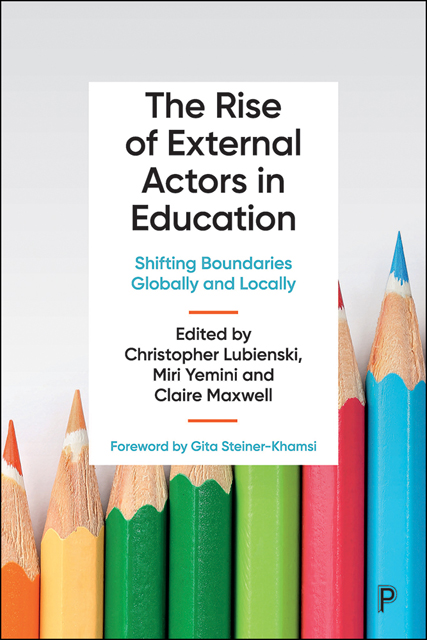Book contents
- Frontmatter
- Contents
- List of figures and tables
- Notes on contributors
- Foreword
- Introduction
- 1 Collective parental involvement: an in-between actor
- 2 When teachers become the external actor: private tutoring and endogenous privatisation in Cambodia
- 3 Cross-sectoral alliances in charter schools: the role of boards of directors from for-profit and non-profit sectors
- 4 A communitarian framework for understanding the relations between schools and NGOs
- 5 PISA for sale? Creating profitable policy spaces through the OECD’s PISA for Schools
- 6 Historical reconfigurations of internal/external actors in Danish educational testing practices
- 7 A short history of external agency involvement within education in contemporary Poland
- 8 New philanthropy in the heterarchical governance of education in Brazil
- 9 Venture philanthropy and the rise of external actors in Australian education
- 10 Power struggle in education policy change: the role of knowledge actors in structural reforms in Chile
- Conclusion: Complexity and intentionality of external actors in education
- Index
3 - Cross-sectoral alliances in charter schools: the role of boards of directors from for-profit and non-profit sectors
Published online by Cambridge University Press: 13 October 2022
- Frontmatter
- Contents
- List of figures and tables
- Notes on contributors
- Foreword
- Introduction
- 1 Collective parental involvement: an in-between actor
- 2 When teachers become the external actor: private tutoring and endogenous privatisation in Cambodia
- 3 Cross-sectoral alliances in charter schools: the role of boards of directors from for-profit and non-profit sectors
- 4 A communitarian framework for understanding the relations between schools and NGOs
- 5 PISA for sale? Creating profitable policy spaces through the OECD’s PISA for Schools
- 6 Historical reconfigurations of internal/external actors in Danish educational testing practices
- 7 A short history of external agency involvement within education in contemporary Poland
- 8 New philanthropy in the heterarchical governance of education in Brazil
- 9 Venture philanthropy and the rise of external actors in Australian education
- 10 Power struggle in education policy change: the role of knowledge actors in structural reforms in Chile
- Conclusion: Complexity and intentionality of external actors in education
- Index
Summary
Introduction
In recent years, there has been a growing body of work that has sought to analyse the complex web of external actors that are collectively playing a growing role in education reform, such as the expansion of venture capital in education (Reckhow & Snyder, 2014; Ferrare & Setari, 2018; Ball, 2019). The proliferation of external actors (that is, philanthropic venture capitalists and education entrepreneurs) in education has, in part, been an outcome of privatisation and deregulation of institutions around the world (Apple, 2006; Ball, 2012; Buras et al, 2013). Scholars have been drawn to these external actors as it has become clear that the interconnected web of organisations and initiatives with aligned missions and coordinated strategies can play an influential role in education reform, particularly around various forms of public school choice, such as charter schools (Au & Ferrare, 2014; Kretchmar et al, 2014; Castillo, 2020; Stahl, 2020).
The robust charter school movement, conceived in 1991 in Minnesota, reflects a broader politics of education empowered to challenge the status quo of the top-down approach to education governance, bureaucratic administration, and uneven progress in student performance. (Wohlstetter & Smith, 2006; Toma & Zimmer, 2012). Charters have since expanded into a nationwide phenomenon that spans 44 US states plus the District of Columbia, with over 7,000 schools serving three million students (National Center for Education Statistics, 2020). In just over three decades, charter schools have shifted from the fringe of school reform to become one of the fastest-growing education reform efforts (Hesla et al, 2019). The rise in support for charter schools has taken shape alongside financial support from venture philanthropy, the targeted presence of both non-profit and for-profit organisations geared up for opening a network of charter schools in many low-income communities, and a mix of federal, state, local government, and private sector support for using the charter school model in turning around chronically underperforming public schools (Bulkley & Henig, 2015; Glazer et al, 2019). While charter schools are not the only schooling option in the US educational system, the charter school sector provides a rich setting for exploring strategic alliances with a wide variety of players (Morley, 2005) and a decentralised system of public school governance featuring a board of directors (Vergari, 2007).
- Type
- Chapter
- Information
- The Rise of External Actors in EducationShifting Boundaries Globally and Locally, pp. 50 - 79Publisher: Bristol University PressPrint publication year: 2022



